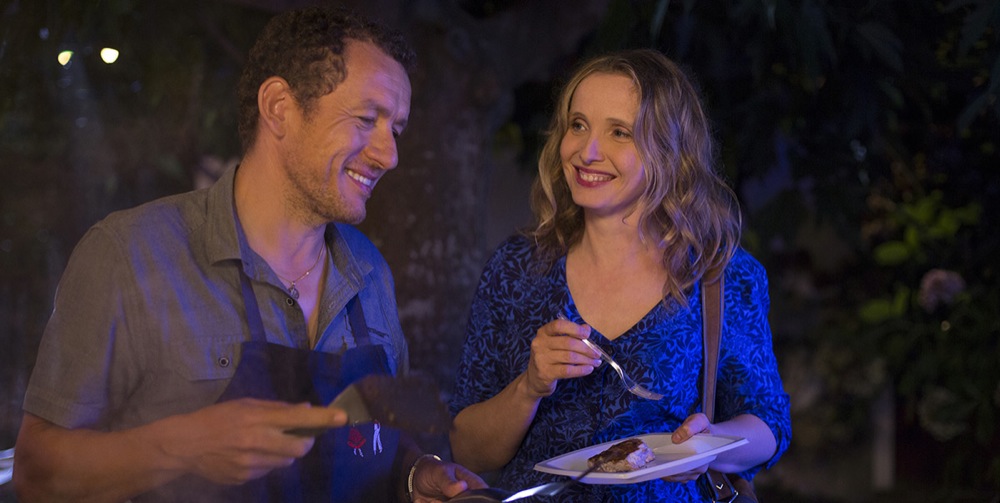Finding Love in Lolo

ABOVE: JULIE DELPY IN LOLO
When we caught up with Julie Delpy from her Los Angeles home last week, she was researching the “life expectancy of critters” for her six-year-old son. “How long does a hamster live?” she asks. (He doesn’t have a hamster, she reports. “Not yet,” at least.) She’s been a Los Angeles resident for more than two decades, and describes it as “another life” from what she knew in France. She still maintains a close connection to her homeland, though, producing as many French films as she does American. Her most recent effort, Lolo, is one such Parisian-filmed production. Delpy wrote, directs, and stars in the film, playing a neurotic middle-aged mother named Juliette who finds love while on vacation in Biarritz. But when her seaside romance and fast-paced city life collide—not to mention the collision between her new boyfriend Jean-René and her sociopathic son, the titular Lolo, short for Éloi—chaos ensues.
Triple-threat Delpy has been working at the intersection of these film crafts for much of her career. She and Ethan Hawke worked with Richard Linklater on the Before Sunrise trilogy, devising a script that made sense for their interpretations of characters. She wrote, directed, and starred in the diptych 2 Days in Paris and 2 Days in New York. “It’s actually a lot of physical work,” she says. “You never have a minute for yourself.”
Lolo is remarkable in its straightforward assessment of a middle-aged woman’s new shot at romance. “Feeling in love and falling in love is completely happening in your 40s,” Delpy says. “That’s a reality that is not translated much in movies.”
“I think in your 20s you’re confused,” she explains. “You want the best of everything, and then in your forties you just want something purer or more profound in companionship.” If there were to be a thesis statement for Lolo (something Delpy vehemently denies—”It would be pretentious to say that.”), it would be this: young love is no less valid, but a 45-year-old’s romance deserves its fair share of the screen.
KATHERINE CUSUMANO: What led you to focus on what I think is probably the most essential of relationships, between a mother and a child, as the foundation for a comedy?
JULIE DELPY: The film is above all a comedy, and it’s not far from films from the ’50s and ’60s like Bad Seed or Children of the Damned. The children are the dark entity in the film, and I wanted to make a comedy out of it and then talk about issues—for example, sociological issues like women in their 40s starting their life again with a new man, parents with kids that never leave the home. I’ve seen this situation quite a lot before, especially single mothers who have raised a kid alone where they’re struggling and they don’t want the kid to leave, but at the same time, they wish they would have a little more space. In this film, it’s extreme, because it’s a comedy and so it’s pushing it a little bit.
CUSUMANO: I was thinking about the broader themes of the film, and it’s actually very heavy for a comedy. So how did you find the levity in those serious moments like when Jean-René hangs Lolo off the apartment balcony, and the obsession of a son with his mother?
DELPY: I wanted it to be a comedy but still have a dark side to it. It goes very far. How do you make a comedy and go far with the moments? By making a lot of physical comedy, you can always undercut it, and also by making it absurd. Everything that happens to Jean-René is announced to the audience before it happens—you know something bad is going to happen, so it can only be funny because it’s not a suspense movie. For example, Lolo doesn’t poison him—he puts itching powder in his clothes, which is kind of absurd and crazy and ridiculous.
CUSUMANO: You can tell just from that first smirk on his face that he’s up to something.
DELPY: Exactly. Once you know it’s a movie about a guy getting rid of another guy, then you can display the comedic elements. Some really crazy shit happens.
CUSUMANO: Definitely. Some of your best work recently has been in comedy, even though you tended towards drama at the beginning of your career. Did you feel any need to prove yourself in drama before doing funny things?
DELPY: I’ve always been drawn to comedy because I think it’s a way for me to handle situations in my life. I read the news and then I’m devastated, and I think the only way to handle this world at this point, to me, is to try to laugh things off. It may not be professional, but I feel I’m blessed to be able to make people laugh. Everything is so miserable out there. Especially now, in Europe, it’s a living hell for so many people. It’s not just in Europe. It’s everywhere. But it’s so nice to be able to entertain people. The truth is, my next film will be a drama probably, because now I’ve reached my level where I will feel guilty to be having fun. I feel like I need to reach a place that’s darker in me. I have to go back and forth all the time. I’ve done a bunch of comedies and now I want to do a drama again. I go back to doing a drama because I feel like I need to say something more essential about feelings and people and all that.
CUSUMANO: Is there something that you were trying to say with Lolo?
DELPY: Outside of making people laugh, I was not trying to say something essential. I was just trying to make a comedy and talk a little bit about women in their 40s and rebuilding your life. Maybe also the subject of, how do you raise children without messing them up? That’s very scary—you see parents that have done everything for their children, and then their children are completely fucked up. And then I see kids that were raised with nothing, that have struggled all their life, and they’re doing better than the kids that supposedly had a happy childhood. So I raise that question a little bit. How do you raise someone that’s going to function in the real world later in life?
CUSUMANO: Another reality that is not translated very much in film is the kind of sexual candor that your characters often have, in a way that I think is taboo for a lot of female characters onscreen. They have sex, they enjoy it, they talk about it, and so I wanted to talk to you a little bit more about why it’s important to write characters and write dialogue like that.
DELPY: I really wanted the women in the film to be completely liberated and completely open about their sexuality. They know what they want, they know what they like, and they make fun of it. That’s important as well—the humor inside of it. That was important for me, to show this stage in a woman’s life where you know what you like and want. She’s at that point where she can joke about it; sex is not just crazy and passionate, it becomes almost ridiculous. I think when you grow up sexuality is very important, but it’s also something you can make fun of. It’s not as sacred. Someone asked me a question the other day—they were like, “French women have more sex.” I’m like, “What do you mean, they have more sex?” Being overly funny and talking about sex doesn’t make you a nymphomaniac.
CUSUMANO: The cool thing about it, too, is that it’s all about what a man can do for a woman rather than the reverse.
DELPY: I was talking with Dany about that. He’s the person that is being fantasized about in the film. Usually women are the person that’s being fantasized about in the film. In my film, the men are objectified, not the women. The women are the neurotic, active beings and the men are more the passive, objectified persons, because I’m a woman and I see it from my perspective.
CUSUMANO: Do you think that there is a link between neurosis and being an active character?
DELPY: When you are the one with the neurosis, you are the one with complexity and all the complex issues, therefore I think it makes you more of the central character. As more women develop women characters, you bring more complexity to women and more craziness to women characters. It’s always the men questioning life, questioning love. I’d like to bring my women to a place where they’re the ones with all the messing up in their heads. I try to really write the complexity of men as well, because I’m very in tune with the male complexity. Maybe it is a bit clinical to say, but the truth is, I find men more fragile in many ways.
CUSUMANO: I think that Jean-René is definitely a pretty fragile character.
DELPY: Jean-René is a naïve, kind man, which is a quality I love in characters or individuals in general. I have such an admiration for people like that, because I’m not like that. I’m just constantly seeing the dark side of things and I adore people who always see the glass half-full. The guy has the worst view on the Eiffel Tower, but he’s still happy. He sees the tip of the tip of the Eiffel Tower. He has a shit view of the Eiffel Tower. I would be calling the landlord and complaining. But he’s the kind of man who uses it as a plus. At the same time, you know he’s going to get it really bad from Lolo, because Lolo is the opposite.
CUSUMANO: What is your take on the end of the film when Jean-René’s daughter Sabine comes out at the end a lot like Lolo in the beginning of the film?
DELPY: The end of the film is a little wink, like in horror films. At the end of Carrie, the hand comes out of the grave. At the end of all horror films, you see a little wink that something is next. The film is a comedy but I’m building it a bit like a thriller or a horror film. It’s kind of making fun of that idea, that it could have been a thriller or horror film, but basically it’s not, in the end.
LOLO IS CURRENTLY SCREENING AT THE TORONTO INTERNATIONAL FILM FESTIVAL.






